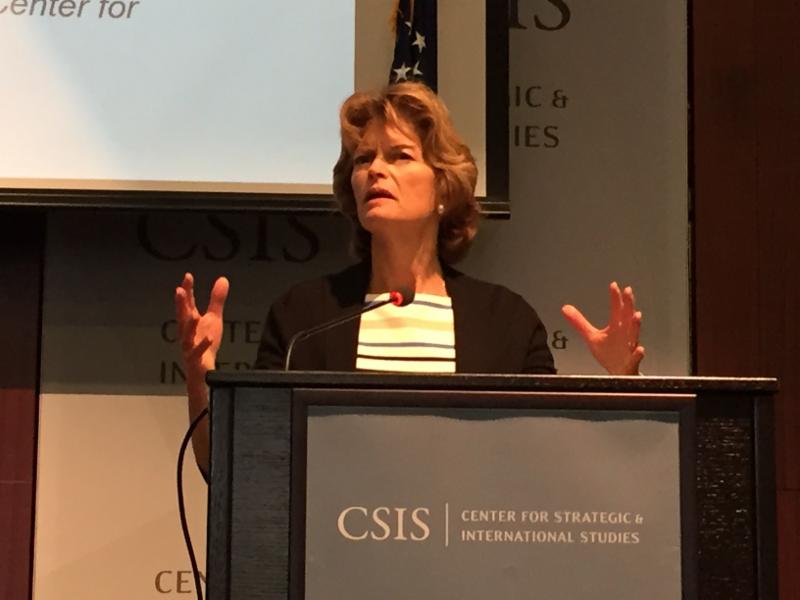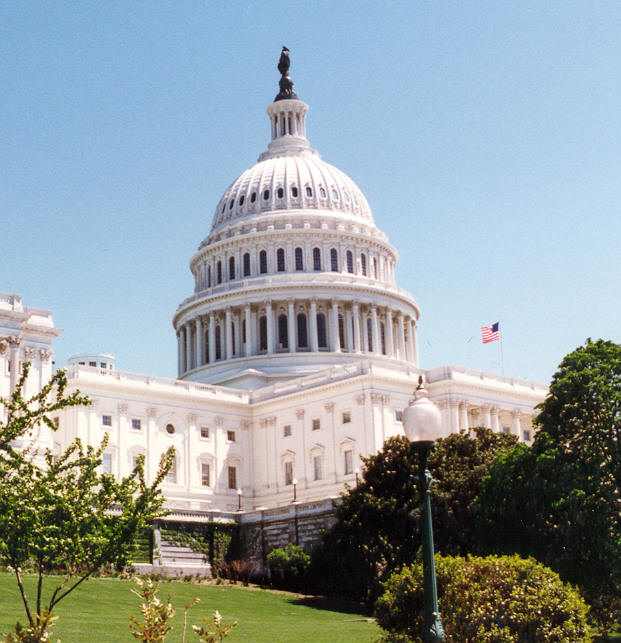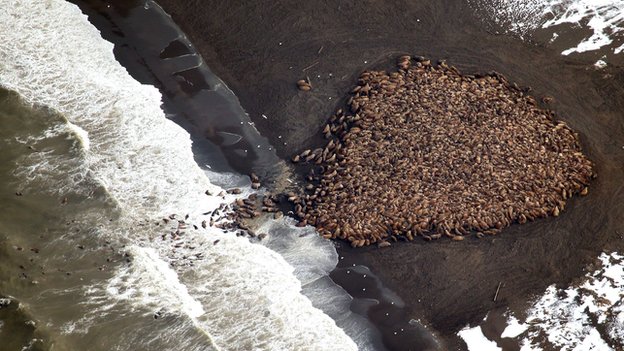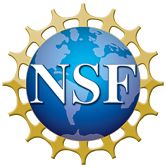|
|
|
|
|
|
|
|
 CSIS. Arctic Transformation: Understanding Arctic Research and the Vital Role of Science, September 16, 2015, 8:30 am to 12:30 pm, Washington, DC. Co-organized by the Senate Arctic Caucus and the Center for Strategic and International Studies (CSIS). Featuring opening remarks by Senators Lisa Murkowski (R-AK) and Angus King (I-ME). With a keynote address by Dr. John Holdren, Chair, Arctic Executive Steering Committee, Director of OSTP, The White House. Panelists include Larry Hinzman, Richard Glenn, George Roe, Paul Mayewski, Martin Jeffries, Kelly Falkner, John Farrell, and Cathy Cahill. CSIS's Senior VP, Heather Conley, will moderate. CSIS. Arctic Transformation: Understanding Arctic Research and the Vital Role of Science, September 16, 2015, 8:30 am to 12:30 pm, Washington, DC. Co-organized by the Senate Arctic Caucus and the Center for Strategic and International Studies (CSIS). Featuring opening remarks by Senators Lisa Murkowski (R-AK) and Angus King (I-ME). With a keynote address by Dr. John Holdren, Chair, Arctic Executive Steering Committee, Director of OSTP, The White House. Panelists include Larry Hinzman, Richard Glenn, George Roe, Paul Mayewski, Martin Jeffries, Kelly Falkner, John Farrell, and Cathy Cahill. CSIS's Senior VP, Heather Conley, will moderate.
Hydrographic Services Review Panel, September 16-18, 2015| Emerging Arctic Priorities, September 17, 2015. The HSRP is a federal advisory committee established to advise the NOAA Administrator about its navigation (i.e. charts and ENCs), physical oceanographic (i.e. tides & water levels), geospatial, positioning, and shoreline programs, products, and services. Lawson Brigham will report out on recommendations to NOAA from his working group on Emerging Arctic Priorities to the Hydrographic Services Review Panel (HSRP), Federal Advisory Committee. This will occur at 1:30pm, Thursday, September 17, the Doubletree Hotel, 8727 Colesville Road, in Silver Spring, MD.
LOCATIONS and TIMES:
September 16, 10:30am NOAA Science Center, 1301 East West Highway, Silver Spring, MD. Entrance to the NOAA building requires a photo ID for non-Federal employees.
Please plan 20 minutes to access the building through security and similar time if parking.
September 17, 9am Doubletree Hotel Silver Spring, 8727 Colesville Rd., Silver Spring, MD
September 18, 8am Doubletree Hotel Silver Spring, 8727 Colesville Rd., Silver Spring, MD
 Today's Congressional Action: Today's Congressional Action:
The House is not in session. The Senate is expected to consider non-Arctic legislation.
|
 Let's Make a Deal on Appropriations? So Far, No. The end of the fiscal year is just two weeks away, but neither chamber has released an appropriations bill to fund the government past Sept. 30. Republican leaders, however, hope to remove a key barrier to getting agreement among their ranks. Despite the desire of Speaker John A. Boehner, R-Ohio, and Senate Majority Leader Mitch McConnell, R-Ky., to avoid government shutdown drama, they have yet to settle on a strategy for preventing one while satisfying hardline conservatives who say they will not vote for any spending bill that provides money for Planned Parenthood.Although the House will vote on two abortion bills this week, a nod to conservatives who insist Congress has to take action after the release of a series of undercover videos showing Planned Parenthood executives discussing the harvesting of fetal tissue, House Majority Whip Steve Scalise is putting a new option on the table. Roll Call Let's Make a Deal on Appropriations? So Far, No. The end of the fiscal year is just two weeks away, but neither chamber has released an appropriations bill to fund the government past Sept. 30. Republican leaders, however, hope to remove a key barrier to getting agreement among their ranks. Despite the desire of Speaker John A. Boehner, R-Ohio, and Senate Majority Leader Mitch McConnell, R-Ky., to avoid government shutdown drama, they have yet to settle on a strategy for preventing one while satisfying hardline conservatives who say they will not vote for any spending bill that provides money for Planned Parenthood.Although the House will vote on two abortion bills this week, a nod to conservatives who insist Congress has to take action after the release of a series of undercover videos showing Planned Parenthood executives discussing the harvesting of fetal tissue, House Majority Whip Steve Scalise is putting a new option on the table. Roll Call
Inuit Circumpolar Org Plays Big Role With Little Cash. The Arctic expertise of the Inuit Circumpolar Council, which currently represents Inuit internationally, is more and more in demand at high-level conferences. But it's not because of the current Conservative government that ICC-Canada is able to represent Inuit from Canada internationally. That was clear from what ICC-Canada president Duane Smith had to say Sept. 15 during the organization's annual general meeting in Cambridge Bay. Nunatsiaq Online
Study: Warmer Arctic Means Faster Mosquito Growth, Spelling Hazard for Caribou. Earlier spring melt usually means earlier emergence of Arctic mosquitoes, as foes of the biting insects know well. Now a study from Dartmouth College that combined field observations in Greenland with controlled experiments has quantified the expected rate at which mosquitoes development will accelerate as Arctic temperatures increase. For every 1-degree Celsius increase in temperature, the Greenlandic mosquitoes need 10 percent less time to emerge as adults, concluded the study in the Proceedings of the Royal Society B: Biological Sciences. Alaska Dispatch News
 Could Artificial Rafts Replace Missing Sea Ice for Hauled-Out Walrus? Feds Say No For Now. Federal wildlife officials have rejected a plan floated by an Alaska environmental activist to deploy recycled fuel barges as artificial ocean haulouts in an effort to aid walruses affected by diminished Arctic sea ice. In recent years, thousands of Pacific walruses have hauled out on Chukchi Sea beaches along Alaska's northwestern coast. Some 35,000 were spotted near the village of Point Lay this month. Alaska Dispatch News Could Artificial Rafts Replace Missing Sea Ice for Hauled-Out Walrus? Feds Say No For Now. Federal wildlife officials have rejected a plan floated by an Alaska environmental activist to deploy recycled fuel barges as artificial ocean haulouts in an effort to aid walruses affected by diminished Arctic sea ice. In recent years, thousands of Pacific walruses have hauled out on Chukchi Sea beaches along Alaska's northwestern coast. Some 35,000 were spotted near the village of Point Lay this month. Alaska Dispatch News
Northern Fleet Exploring Arctic Seabed. The "Vizir", a Northern Fleet vessel, is currently conducting research operations around the far northern islands of Vize, Uzhakov, Shmit and the archipelago of Northern Island (Severnaya Zemlya), Navy representative Vadim Serga says to RIA Novosti. "The expedition is conducting a task of vital national importance - the determination of the geographical lines of extension of the territorial waters, the economic zone and the continental shelf in the area", Serga underlines. Barents Observer
Arctic Sea Ice Reaches 4th-Lowest Extent on Record. Arctic sea ice hit its fourth-lowest annual minimum in the satellite era, as melting appeared to come to a halt Friday, the National Snow and Ice Data Center said in a preliminary report issued Tuesday. With sea-ice extent reaching a minimum of 1.7 million square miles (4.41 million square kilometers), 2015 ranked closely behind 2011, when ice extent retreated to 1.67 million square miles (4.34 million square kilometers), the third-lowest annual minimum on record. The center's report analyzes satellite data collected since 1979. It defines extent as areas with at least 15 percent ice coverage. Alaska Dispatch News
 NSF Drafts New Arctic Fieldwork Policies. The National Science Foundation, Division of Polar Programs is preparing to release three new policies applicable to people conducting fieldwork in the Arctic supported by the Division of Polar Programs. The draft policies will be posted on the Interagency Arctic Research Policy Committee (IARPC) collaboration portal for public comment. At the Arctic Field Safety Risk Management workshop in 2014 participants discussed the need to clarify some of the issues addressed in these policies. The final report from that workshop will be available in 2-3 weeks. The comment period is September 15 - October 2. Please submit comments to Renee Crain rcrain@nsf.gov NSF Drafts New Arctic Fieldwork Policies. The National Science Foundation, Division of Polar Programs is preparing to release three new policies applicable to people conducting fieldwork in the Arctic supported by the Division of Polar Programs. The draft policies will be posted on the Interagency Arctic Research Policy Committee (IARPC) collaboration portal for public comment. At the Arctic Field Safety Risk Management workshop in 2014 participants discussed the need to clarify some of the issues addressed in these policies. The final report from that workshop will be available in 2-3 weeks. The comment period is September 15 - October 2. Please submit comments to Renee Crain rcrain@nsf.gov
|
|
Legislative Action
No Arctic legislation was formally considered yesterday.
|
|
Future Events
Eighth Polar Law Symposium Alaska 2015, September 23-26, 2015 (Fairbanks and Anchorage, Alaska , USA). The Eighth Polar Law Symposium is co-hosted by Alaska Pacific University (APU), the University of Alaska Fairbanks, the University of Alaska Anchorage (through its Justice Center and its Institute of Social and Economic Research), the University of Washington School of Law, and Vermont Law School, in cooperation with the Arctic Law Section of the Alaska Bar Association. The symposium will be held on both campuses of the University of Alaska. The 2015 theme is: The Science, Scholarship, and Practice of Polar Law: Strengthening Arctic Peoples and Places.
2015 Arctic Energy Summit, September 28-30, 2015 (Fairbanks, Alaska, USA). The Institute of the North's 2015 Arctic Energy Summit builds on our legacy efforts to address energy as a fundamental element of the sustainable development of the Arctic as a lasting frontier.Central to this concept is a focus on providing pathways for affordable energy development in the Arctic and for Arctic communities.
The Arctic Circle is the largest global gathering on the Arctic. It is attended by heads of state and governments, ministers, members of parliament, officials, experts, scientists, entrepreneurs, business leaders, indigenous representatives, environmentalists, students, activists, and others from the growing international community of partners and participants interested in the future of the Arctic. The Arctic Circle highlights issues and concerns, programs, policies and projects; it provides platforms for dynamic dialogue and constructive cooperation. While the plenary sessions are the responsibility of the Arctic Circle, the breakout sessions are organized by various participating partners in their own name and with full authority over the agenda and the choice of speakers.
2015 Arctic Science Conference, October 1-3, 2015 (Anchorage, Alaska, USA). The conference theme is "Healthy Estuaries: Sustainability and Resilience." Conference topics include traditional scientific disciplines, science education, arctic social sciences, biomedical research, and artistic interpretation of the evolving North. Abstract submissions are now being accepted. The deadline is August 1, 2015.
The Polar Oceans and Global Climate Change, November 3-6, 2015 (La Jolla, California USA). The American Polar Society will host this Symposium at Scripps Institution of Oceanography. A flyer with a partial list of presenters is available on the Society's website (americanpolar.org) and from the Society's Membership Chairman by email.
Forum for Arctic Modeling and Observational Synthesis Meeting, November 3-6, 2015 (Cape Cod, MA, USA). On November 3rd, the 2015 School for young scientists will consider "Regional Oceanography of the Arctic marginal seas" with lectures covering major features of atmospheric, sea ice and oceanographic regimes of the: Bering, Chukchi, Beaufort, East-Siberian, Laptev Sea, Kara, Barents and Nordic seas. On November 4-6, the meeting portion will summarize project accomplishments for the last 3 years of activities and will focus on the formulation of scientific questions and directions for FAMOS future research (2016-2019) to: (a) improve Arctic modeling, employing very high resolution models; (b) develop and test new arctic monitoring/observing systems and (c) improve predictions of Arctic environmental parameters with reduced uncertainties.
Due North: Next Generation Arctic Research & Leadership, November 5-8, 2015 (Calgary, Alberta, Canada). The Association of Canadian Universities for Northern Studies (ACUNS) will convene an interdisciplinary conference of early career scientists working on Arctic issues. Topics will include: Arctic Communities, Arctic Sustainable Development, Arctic Wildlife, Ecosystem and Biodiversity, Arctic Food Security, Arctic Landscapes, Climate Change and Adaptation, Disaster Risk Management, Policy, Politics and Leadership, Arctic Environment (Data and Techniques), Arctic Resources, and Future of Arctic.
Arctic Observing Open Science Meeting, November 17-19, 2015 (Seattle, Washington). The Arctic Observing Open Science Meeting will be 2.5 days and held at the Hyatt at Olive 8 in Seattle, Washington. The conference will bring together individuals and teams involved in the collection, processing, analysis, and use of observations in the Arctic - from academia, agencies, industry, and other organizations. The meeting will be convened as a combination of plenary talks, parallel science sessions, and a poster session. The agenda and registration information will be forthcoming.
In the Spirit of the Rovaniemi Process 2015, November 24-26, 2015 (Rovaniemi, Lapland, Finland).When the Arctic Environmental Protection Strategy, the so-called Rovaniemi Process, was adopted in 1991, it aimed at overcoming divisions and turning the zone of Cold War military tensions into a region of peace and co-operation. In this joint effort focusing on the protection of environment, and later, sustainable development, the Arctic states supported by indigenous organizations laid grounds for institutionalized collaboration and the emergence of Arctic regional identity. The second international conference will bring together decision-makers, scholars, artists, designers and students to address these questions and discuss the Arctic in global, regional and local perspectives.
Arctic Encounter Paris (AEP 2015), December 11-12, 2015 (Paris, France) (During the UN Convention on Climate Change - COP21). The Arctic Encounter Paris will take place at the French Senate at Luxembourg Palace and the French Military College, École Militaire, in Paris, France, on the final days of the monumental United Nations Convention on Climate Change (COP21) where thousands of global citizens and government delegates will be gathered to deliberate the world's response to our changing planet in Paris. The AEP is the only Arctic policy side event currently planned to take place during the UN Convention. A reception will take place following the closing panel.
3rd Annual Arctic Encounter Symposium (AES 2016), January 15-16, 2016 (Seattle, WA, USA). Building upon the preceding Arctic Encounter event in Paris, the third annual Arctic Encounter Symposium (AES) in Seattle, Washington will convene policymakers, industry leaders, and leading experts to confront the leading issues in Arctic policy, innovation, and development. As the largest annual Arctic policy event in the United States, the AES mission is to raise awareness, engage challenges, and develop solutions for the future of a region and a people. The two-day program includes two keynote luncheons, expert plenary sessions, break out sessions, a networking cocktail reception and seated dinner at the Museum of History and Industry on South Lake Union. A closing reception will take place at the conclusion of the program. The official host of the third annual AES is the University of Washington School of Law.
|
|

  
4350 N. Fairfax Drive, Suite 510
Arlington, VA 22203, USA
External links in this publication, and on the USARC's World Wide Web site ( www.arctic.gov) do not constitute endorsement by the US Arctic Research Commission of external Web sites or the information, products or services contained therein. For other than authorized activities, the USARC does not exercise any editorial control over the information you may find at these locations. These links are provided consistent with the stated purpose of this newsletter and the USARC Web site.
|
|
|
|
|
|
|
|
|